May 24, 2012 -- Updated 1405 GMT (2205 HKT)
STORY HIGHLIGHTS
- NEW: The elections could help bring security to Egypt's people, a former U.N. official says
- Egyptians come out for a second day in their historic vote for president
- Egypt is heading toward "unhappy settlement" with its military, one expert says
- "I am here to vote for the first time in my life," a 70-year-old woman says
Government employees have
been given the day off work to vote in the first Egyptian presidential
election in history where no one knows what the result will be before
the ballots are cast.
Voting was going smoothly
in a northern suburb of Cairo on Thursday, where women were waiting
half an hour to 45 minutes to cast their ballots.
After the polls closed on
Wednesday, the first day of voting, a former top United Nations
official said the election could be a turning point for the country.
If "ordinary Egyptians
see this as a legitimate expression of their own popular will,"
regardless of who wins, "then it can be a prelude to the real return of
security and stability in the country," said Mark Malloch Brown.
The former top diplomat
and development expert said he was very optimistic about Egypt in the
medium term, even if the country was probably in for a "bumpy ride" in
the short term.
"We went through this
with Eastern Europe after 1989," when the Communist regimes there fell,
Malloch Brown told CNN's "Connect the World" program. "It just takes
time. People need to settle into a new political order. Whatever happens
in the next months, people need to just hold onto the fact that (Egypt)
will get there."
He predicted that a
post-revolutionary Egypt would be "a little bit more Islamic than it was
before, a little bit more feisty and independent vis-a-vis the U.S. and
Israel," while domestically, it would "really try and focus on doing a
much better deal for poor Egyptians."
A wave of enthusiasm swept across polling stations on Wednesday.
"Finally, Egypt is
born," one weeping 80-year-old man said on Wednesday to Rep. David
Dreier, a California Republican who is in Cairo as an election observer.
Grandmother Nadia Fahmy,
70, was so determined to be the first one to vote at her polling
station that she camped out in a plastic chair for 2½ hours before it
opened on Wednesday.
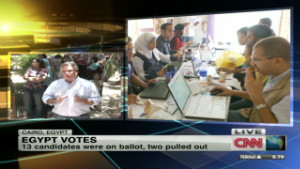 Second day of voting in Egypt
Second day of voting in Egypt
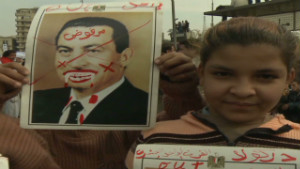 Egypt elections: To vote or not to vote?
Egypt elections: To vote or not to vote?
 Why Egyptian election matters
Why Egyptian election matters
 Why Egyptian election matters
Why Egyptian election matters
"I am here to vote for
the first time in my life," said Fahmy. "I want to see a new generation
for my country. I want everything to change."
Other people told CNN
they had waited up to four hours to vote as an atmosphere of enthusiasm
swept polling stations in the capital.
The voting is a
monumental achievement for those who worked to topple longtime President
Hosni Mubarak in one of the seminal developments of the Arab Spring
more than a year ago. And it could reverberate far beyond the country's
borders, since Egypt is in many ways the center of gravity of the Arab
world.
"Egypt has always set
trends in the Arab world and for Arab political thought. Trends spread
through the Arab world and eventually affect even non-Arab,
Muslim-majority countries," said Maajid Nawaz, the chairman of Quilliam,
a London-based think tank.
Egypt's election "bodes
well for the rest of the Arab world and particularly those countries
that have had uprisings," said Nawaz, a former Islamist who was
imprisoned in Egypt for four years for banned political activism.
Amnesty International
was critical of the military leaders who rule Egypt in its annual report
on human rights around the world, which was released Thursday.
"There's a number of
reasons for that," said Philip Luther, deputy director of Amnesty
International's Middle East and North Africa program.
"One is that in some
cases they've continued the abuses of the Mubarak regime, in that over
100 people have been killed in the streets in demonstrations as a result
of excessive force used by security or military forces. So there's a
real problem there which certainly mirrors the over 800 deaths that
occurred during the uprising itself," he said.
Amnesty is also opposed
to the use of "virginity testing" on some women protesters, saying it is
"tantamount to torture and totally unacceptable."
The authorities have not
done enough to ensure that women can contribute on an equal footing
with men to the ongoing process of political reform, he also said.
Amnesty wants whoever takes office as president to end the state of emergency and end the use of military trials for civilians.
There are 13 candidates
on the ballot, although two withdrew from the race after ballots were
printed. If no candidate gets a majority of the vote in the first round,
a second round will be held June 16-17.
Results of the first round are not expected before the weekend.
Some 30,000 volunteers
have fanned out to make sure the voting is fair, said organizers with
the April 6 youth movement, which has long campaigned for greater
democracy and rule of law in Egypt.
They reported only minor
violations on Wednesday, mostly supporters of one candidate or another
trying to influence voters at polling stations.
There is a pervasive
fear that the powerful military, which has run the country since the
fall of Mubarak, could try to hijack the election.

'Fighting for a secular state' in Egypt

Youssef: Egypt politics must accept humor
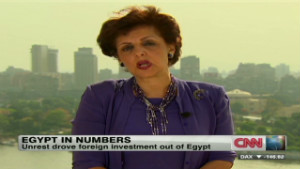
Egypt's struggling economy
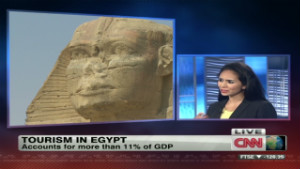
Tourism trickles back into Egypt
The concern persists
despite the insistence of the Supreme Council of the Armed Forces that
it will hand over power to an elected civilian government. The military
leaders put armored personnel carriers on the streets with loudspeakers
broadcasting a message that they will relinquish power, but that did not
convince doubters.
Nawaz, the analyst in
London, said Egypt probably is not heading toward a simple case of the
military either giving up control or rejecting the results of the
election.
Instead, he anticipated,
there will be an "unhappy settlement" where the military remains
"ever-present, in the shadows," influencing the civilian government
without controlling it.
"Egypt is going along
similar lines to Turkey or Pakistan," he said, naming two other
countries that have formal democracies in place but where a powerful
military can affect events.
The degree to which the
military continues to exercise control in Egypt will depend on who wins
the election, Nawaz anticipated -- but he laughed aloud when asked to
predict who that would be.
Whoever wins the election, Nawaz said, will face tremendous challenges, even without worries about the army.
"They are inheriting a
failed economy, an abysmal bureaucracy, a frustrated people, and a deep
distrust on behalf of the people towards their military and any
policing," Nawaz said.
And Egypt has an elaborate political mosaic where alliances shift quickly, he added.
Secular democrats oppose
military rule, for example, but if an Islamist candidate wins the
presidency, "Some of the democrats would switch because they would
rather have military rule than the Islamists," Nawaz said.
"It's far more
complicated than 'Islamists vs. liberal democracy.' It's rich vs. poor,
(hardline) Salafists vs. the (more moderate) Muslim Brotherhood,
secularists vs. Islamists," he said.
On top of that, the
country does not yet have a new constitution defining the powers of the
president or the parliament, after a court last month suspended the
committee charged with writing it. The court ruled that the members of
the committee did not reflect the national population well enough.
Among the candidates vying for the presidency are Mohamed Morsi, of the Muslim Brotherhood's Freedom and Justice Party; Amre Moussa, who served as foreign minister under Mubarak and headed the Arab League; Abdelmonen Abol Fotoh, a moderate Islamist running as a respected independent; Ahmed Shafik, who was Mubarak's last prime minister; and Hamdeen Sabahy, a leftist dark-horse contender.
The vote comes nearly 16
months after the popular uprising that brought down Mubarak in February
2011. Mubarak was tried on charges of ordering police to shoot
protesters during the uprising against him, and of corruption.
He is awaiting the court's verdict and could potentially face the death penalty.
Despite the high-profile
trial of the man who ruled the country for 30 years, popular distrust
and anger, particularly against the military's power in Egyptian
governmental affairs, still inspire protests, some of which have been
marked by deadly clashes.
Protesters are upset at
what they see as the slow pace of reform since Mubarak's ouster. Some
are also concerned that the country's military leadership is delaying
the transition to civilian rule.
In January, two Islamist
parties won about 70% of the seats in the lower house of parliament in
the first elections for an elected governing body in the post-Mubarak
era.
The Freedom and Justice
Party won 235 seats and the conservative Al Nour party gained 121 seats
in the People's Assembly, according to final results. The assembly
consists of 498 elected members, and the rest of the seats were divided
among other parties.
CNN's Salma Abdelaziz and Hala Gorani and
journalists Ian Lee and Mohamed Fadel Fahmy contributed to this report
from Cairo. Richard Allen Greene and Laura-Smith Spark reported from
London.

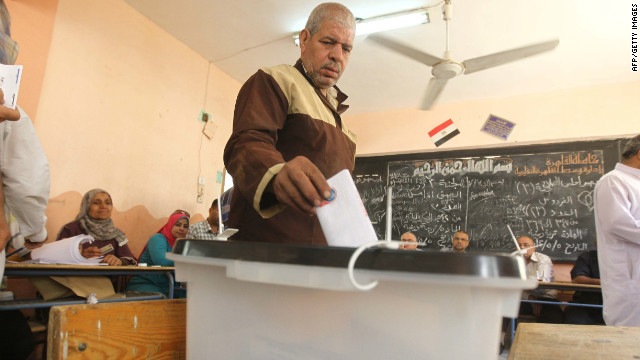
No comments:
Post a Comment